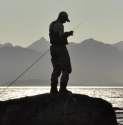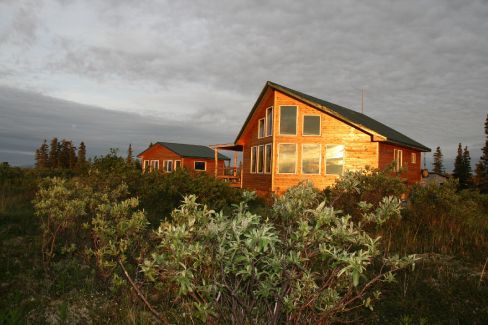Nick Lyons is one of the biggest names when it comes to fly fishing literature. In charge of The Lyons Press, he has published some of the most recognized books on the matter, working with legendary anglers like Lefty Kreh and Swisher and Richards, finding new authors and reprinting classics. Spring Creek, Confessions of a Fly Fishing Addict and every other book on his name, as well as his last-page column on Fly Fisherman magazine for more than 20 years, have made Nick Lyons a true household name in the fly fishing world.
Fd: When did you start fly fishing? Can you tell us your memories from those days?
Nick: I had fished from before memory but I only started to fly fish seriously in my early 20s and was immediately mad for it. I had no instruction and found that I could not cast well when I threaded the line through the keeper ring. I fished in Michigan when I was in graduate school and caught nothing in the great AuSable. Back in NYC I fished a little club stream in New Jersey to which an army friend belonged--and finally began to get some fish, which made it all more worthwhile.
Fd: What are the reasons that made you start writing about fishing? What do you think drives people to do that?
Nick: I had been writing literary criticism but one day in my thirties I took a memorable trip to the Beaverkill with a remarkable new friend and immediately wrote "Mecca" and a little later "First Trout, First Lie" about a trout I had gigged in a small Catskill stream in mid-summer. FIELD & STREAM published them a few months later, my first writing about fishing. I loved the new "voice" I had found, so far from the heavy academic prose I had been writing.
Fd: How did you start working on publishing fly fishing books? How did you come across such great authors and works on the early days?
Nick: I was teaching English at Hunter College and (with four young children) took a second job at Crown Publishers. I wanted books closer to my heart than the commercial fare they published. Art Flick's STREAMSIDE GUIDE was out of print and I wanted a copy so I got the rights and that was the first. Crown asked me to put together an anthology and I compiled FISHERMAN'S BOUNTY and happily this put me in touch with a whole host of first-rate writers, like Marinaro, whom I published next.
Fd: What can you tell us about the process of finding new authors?
Nick: There's no substitute for reading widely, in all of the magazines on the subject, and in my case I asked just about everyone I came in contact with--or published--for their suggestions and pursued matters from there. I always leaned toward the literary but for non-fiction I tried to think of what "needed" to be done--Lefty Kreh on saltwater fly fishing, Swisher-Richards on new patterns--always the best I could find on worthwhile subjects.
Fd: Out of curiosity, what are the all-time top selling books on fly fishing?
Nick: SELECTIVE TROUT, ART FLICK’S STREAMSIDE GUIDE, PRACTICAL FISHING KNOTS, and THE ORVIS FLY FISHING GUIDE.
Fd: What are your thoughts on the amount of information available on the internet in contrast to the magazine and book industry?Nick: I try not to follow the internet and consider most of it too simplified, in too many "bites".
Fd: What are your all-time favorite books and authors related to the outdoors and fly fishing? What recent books would you recommend?Nick: Ted Leeson, THE HABIT OF RIVERS. Roderick Haig Brown, A RIVER NEVER SLEEPS. Norman Maclean, A RIVER RUNS THROUGH IT. Tom McGuane, anything he writes.
Fd: You have published the collected writings of Hemingway and Traver on fishing. Do you think it is possible, in these times, to have another outdoors writer of this level? Or having one that achieves the success of Norman Maclean’s A River Runs Through It?
Nick: I doubt if anyone can match the sales of Maclean, which had a movie to push it along. But McGuane is every bit their equal, though very different.
Fd: How do you envision the future of fly fishing literature?
Nick: It's getting harder to winnow out the best, with so many people in the pool--but you don't need a lot of strong writers at any given time, and there are a lot I like. Practical writing is becoming more sophisticated in technical matters--color photography, for example.
Fd: A good fishing story is surely not enough, and a good writer still needs something to write about. What advice would you give to those who want to write about fly fishing?
Nick: Always read the best being written by others--and write from the heart not for the purse. Quintilian says: The heart makes the eloquence.
Fd: Being a key figure in the fly fishing editorial world, have you got a particular aim or message to give out to the global fly fishing community?
Nick: Write less, write more carefully, read the best, write from the heart, avoid all fads.
Fd: Do you consider it important to know about fly fishing history? Why?
Nick: Sure. Faulkner says the past is never past and fly fishing is no exception: knowledge of the past colors everything we do. I'm a passionate supporter of our museums, which preserve and celebrate the past. Some writers, like Theodore Gordon, are eminently wise and readable and often tell us much that we're forgotten.
Fd: Some fishing. What is your favorite kind of fly fishing (dries, nymphing, streamers, etc.) and what are your favorite spots?
Nick: Dry flies on chalk streams and spring creeks (like a couple I know in Montana).
Fd: As a final point, what does fly fishing mean to you?
Nick: Too much to answer briefly. I guess all the books and articles I've written address this. Or I hope so.
[Drawings: courtesy of Mari Lyons]
















